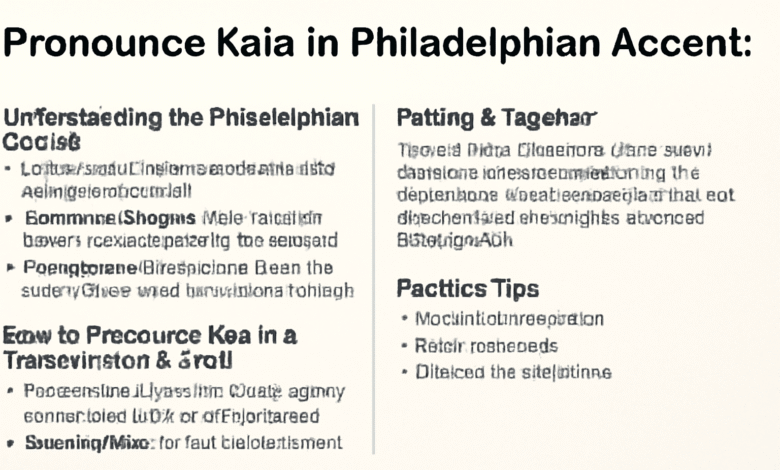How to Pronounce Kaia in Philadelphian Accent: A Detailed Guide

When it comes to accents in the United States, few are as distinctive and colorful as the Philadelphian accent. Philadelphia, a city known for its rich history, passionate sports culture, and unique local traditions, also boasts an accent that is unlike any other in the country. This local flavor of speech has a way of altering even the most common names and words. If you’ve ever wondered how to pronounce “Kaia” in a Philadelphian accent, you’ve come to the right place. In this article, we’ll dive into the nuances of the Philadelphian accent and show you how the name Kaia might sound when spoken by a native of the City of Brotherly Love.
Understanding the Philadelphian Accent
Before we explore the pronunciation of “Kaia,” it’s essential to understand the features that make the Philadelphian accent unique. The accent in Philadelphia is part of the larger Mid-Atlantic regional dialect, but it carries specific characteristics that distinguish it from other accents. While the basics of the American English language may remain the same, certain words and sounds are pronounced differently in Philadelphia due to historical influences and local speech patterns.
Some key features of the Philadelphian accent include:
-
Vowel Shifts: One of the most notable characteristics of the Philly accent is the vowel shift. For instance, the “short a” sound in words like “cat” or “bag” may be pronounced as a broad “a,” sounding more like “ah.” This is one of the most defining features of Philadelphia speech.
-
Consonant Changes: In many cases, Philadelphians drop the “r” sound at the end of words, making words like “car” sound like “cah.” Additionally, the “th” sound in words like “this” or “that” often turns into a “d” sound, so “this” may sound more like “dis.”
-
Syllable Stress and Speed: The rhythm of the Philadelphian accent tends to be faster than other American accents, with an emphasis on the first syllable of many words. This can make the accent sound more clipped and direct, with less focus on the second syllable.
With this understanding of the Philadelphian accent, we can now explore how these features come into play when pronouncing the name “Kaia.”
How to Pronounce Kaia in a Philadelphian Accent
The name “Kaia,” a beautiful and relatively modern name, is typically pronounced as “KAI-uh” or “KAI-ah” in standard American English. But as with many words and names, regional accents can alter the way they sound. In Philadelphia, the pronunciation of “Kaia” will be influenced by the city’s distinctive vowel shifts, consonant modifications, and syllable emphasis.
First Syllable: “Kai”
The first syllable of “Kaia,” which is spelled “Kai,” is often pronounced with an “eye” sound in standard American English. However, in Philadelphia, the “ai” vowel combination may shift to a different sound, typical of the city’s unique vowel shift patterns.
In Philly, the “ai” sound could be pronounced more like a broad “ah,” similar to how words like “bag” or “man” are said. So instead of a clear “eye” sound, you might hear something that sounds like “KAH” or “KAH-eh.”
For example, in standard English, the name “Kai” is pronounced with the long “i” sound, like “KAI.” In the Philadelphian accent, this could shift to something closer to “KAH,” with a drawn-out, open vowel sound.
It’s also important to note that Philadelphians tend to emphasize the first syllable of many words. As such, the “Kai” part of “Kaia” will have the strongest emphasis in the Philadelphian accent, making it sound more pronounced than the second syllable.
Second Syllable: “a”
The second syllable of “Kaia,” represented by the letter “a,” is usually pronounced as “uh” in standard English. However, in the Philadelphian accent, the second syllable may be shortened or even blended more quickly into the first syllable.
This quickening of the second syllable is part of the fast-paced rhythm of Philadelphia speech. The vowel sound might be slightly softened, and in casual conversation, the “a” in “Kaia” may sound more like a quick, unaccented “uh.” In some cases, depending on the speaker’s particular way of pronouncing words, the second syllable could be closer to “ah” or “uh,” but it will generally be softer and less pronounced than the first syllable.
Some Philadelphians might even blend the first and second syllables so that the name sounds almost like “KAH-uh” with a swift, quick second syllable that is not as emphasized.
Putting It All Together: The Philadelphian Pronunciation of Kaia
When you combine the changes to the first and second syllables, the name “Kaia” in a Philadelphian accent will likely sound like “KAH-uh” or “KAH-eh.” The key to this pronunciation is the way the “Kai” part of the name is altered to a broader “ah” sound, while the second syllable is shortened and softened. This is consistent with how many words are pronounced in Philly—emphasis on the first syllable, and a quicker, lighter second syllable.
For example, imagine you’re saying the name “Kaia” with a heavier, almost exaggerated emphasis on the first syllable, followed by a quick, unaccented second syllable. This will give you the signature Philadelphian sound.
Why Pronunciations Matter
Understanding how a name like “Kaia” sounds in a Philadelphian accent isn’t just a fun linguistic exercise—it can also be a way to connect more authentically with local culture. Whether you’re visiting Philadelphia, meeting locals, or simply interested in the nuances of regional accents, knowing how names and words are pronounced in different parts of the country can help you sound more like a native.
Additionally, the way we pronounce names is part of what gives them meaning and identity. For people named Kaia who hail from or live in Philadelphia, hearing their name pronounced in the city’s unique way can create a sense of belonging and connection to their roots.
Practice Tips for Getting the Pronunciation Right
If you want to get the Philadelphian pronunciation of “Kaia” just right, there are a few things you can do to practice:
-
Listen to Local Speakers: One of the best ways to learn the Philadelphian accent is by listening to native speakers. Watch local news broadcasts, movies, or videos that feature Philadelphians, and pay attention to how they pronounce words with similar vowel sounds to “Kaia.”
-
Record Yourself: Try recording yourself saying “Kaia” in your normal accent, then again using the Philadelphian pronunciation. Compare your recordings and adjust accordingly. This can help you fine-tune your accent.
-
Mimic the Rhythm: The Philadelphian accent is known for its fast-paced, clipped rhythm, so practice speaking quickly without overemphasizing the second syllable. This will help you get the overall rhythm of the accent right.
-
Use Online Resources: You can find plenty of online videos and tutorials dedicated to regional accents. Some linguists and accent coaches specifically cover the Philadelphian accent, offering helpful tips and guides for mastering the pronunciation of local names.
Read also: The Emergence and Potential of “M Playjkp Tk”: A Deep Dive Into the Future of Digital Platforms
Conclusion
Pronouncing “Kaia” in a Philadelphian accent requires an understanding of how the city’s unique vowel shifts and rhythm affect the sounds of everyday words. By emphasizing the first syllable and softening the second, you can give this beautiful name a true Philly twist. Whether you’re a Philly native or simply fascinated by regional accents, mastering the Philadelphian way of saying “Kaia” can be a fun and interesting way to engage with the city’s rich linguistic heritage.
So next time you find yourself in Philadelphia or talking with a local, don’t hesitate to practice your new pronunciation of “Kaia” and see how it resonates with native speakers. They’ll appreciate your attention to detail and may even give you some tips on perfecting your Philly accent!



